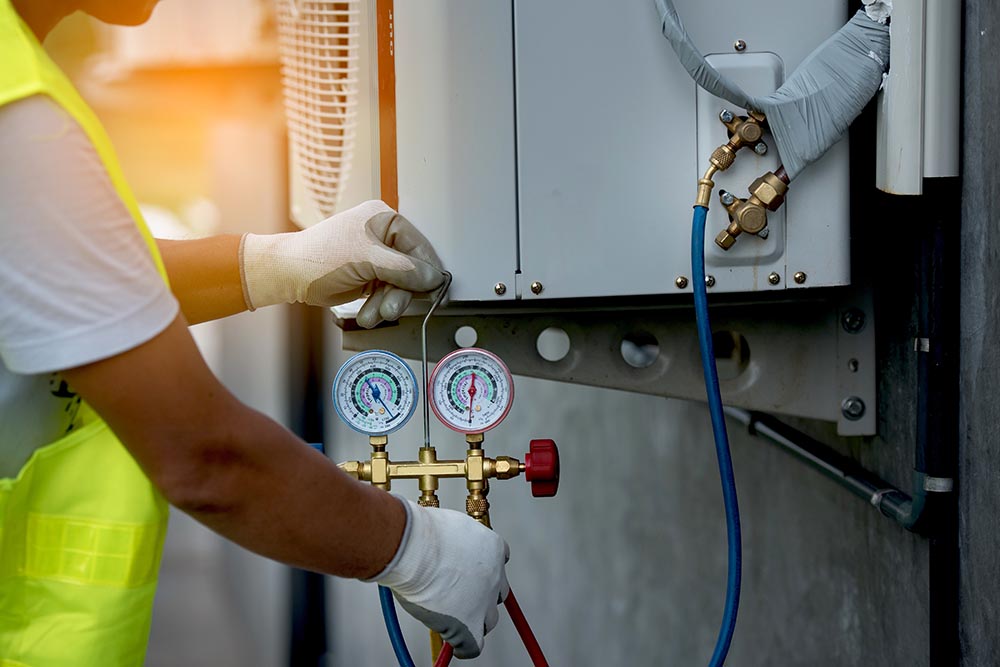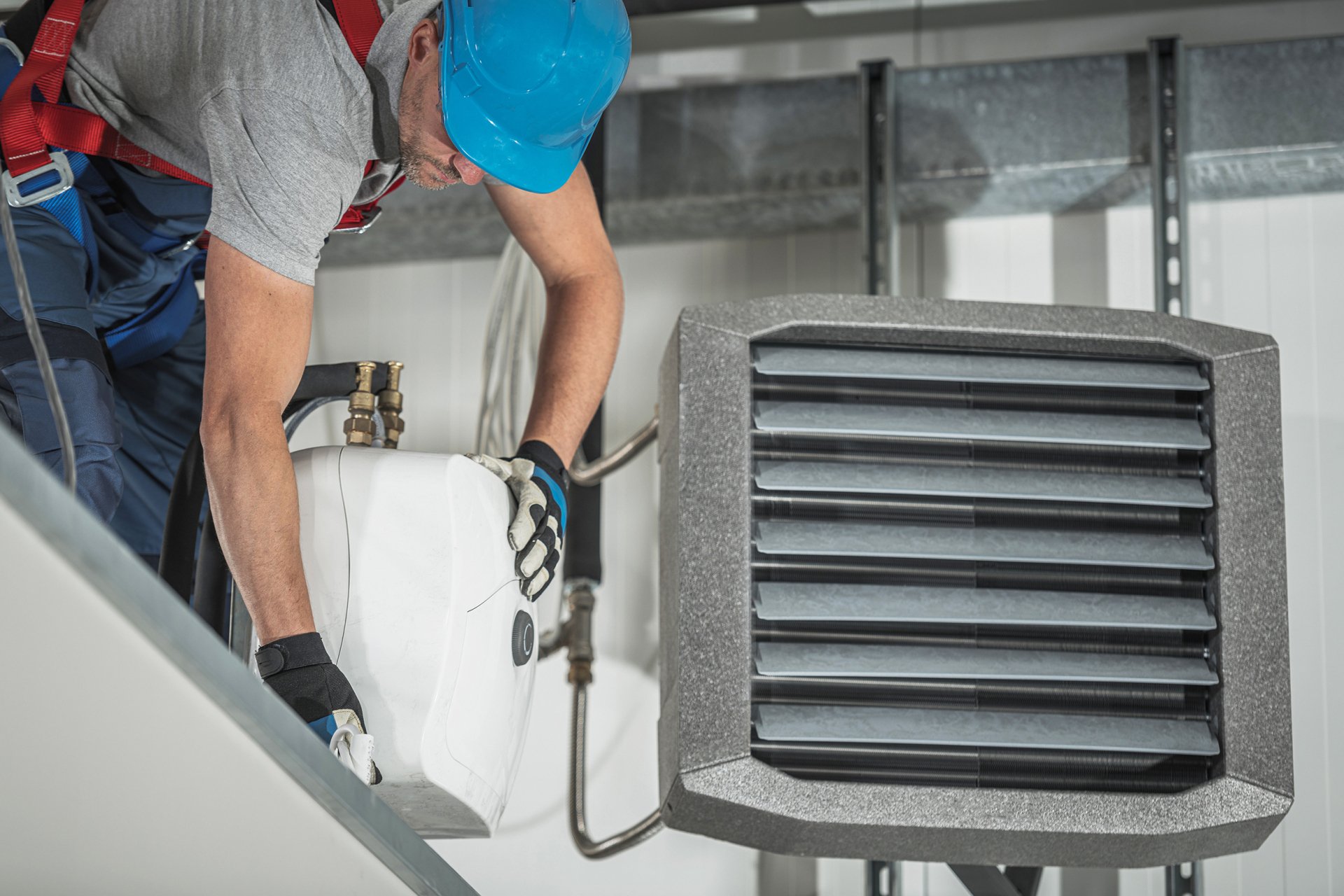Picking In Between a Heat Pump and Furnace: Key Considerations for Your HVAC Demands
When reviewing home heating alternatives for heating and cooling needs, the choice between a heatpump and a furnace can be complicated. Each system offers distinct benefits tailored to specific environments and energy performance goals. Understanding these distinctions is necessary for making an educated choice. Secret elements such as installment prices and environmental effect even more make complex the choice process. Which option genuinely lines up with one's comfort and sustainability preferences? The following areas will discover these considerations in information.
Understanding Warmth Pumps: Just How They Work and Their Advantages
While many homeowners take into consideration different home heating alternatives, comprehending exactly how heatpump feature and their advantages can substantially affect their choice. Warmth pumps operate by transferring heat instead of creating it. In the winter months, they extract warm from the outdoors air or ground and transfer it indoors, while in the summertime, they reverse this procedure, cooling the home by expelling warmth outside. This twin performance makes them versatile for year-round environment control.One of the main benefits of heatpump is their energy effectiveness. They utilize significantly less electricity compared to standard furnace, possibly leading to reduced energy costs (ductless mini splits). Furthermore, heat pumps have a smaller sized carbon impact, making them an ecologically pleasant selection. They additionally need less maintenance than traditional systems, adding to long-lasting price savings. Overall, understanding the auto mechanics and benefits of heatpump can assist property owners make educated choices concerning their home heating and cooling down requirements
Discovering Heaters: Types, Procedure, and Benefits
Heaters come in numerous kinds, including gas, electric, and oil versions, each with distinctive operational mechanisms. Recognizing these distinctions is necessary, as they affect effectiveness and heating performance. Additionally, heaters use numerous advantages, such as constant heat outcome and reliability in cooler environments.
Sorts of Heaters
Heating systems can differ substantially in layout and procedure, with heating systems being a popular selection amongst house owners. There are a number of kinds of heaters, each utilizing various gas sources and technologies. Gas heaters are typical, leveraging natural gas to generate warm efficiently. Electric heaters, on the various other hand, utilize electrical resistance to create heat, usually preferred for their uncomplicated installation. Oil heating systems, while much less common, work in locations with limited gas access (furnace replacement). Additionally, condensing heating systems make best use of energy performance by capturing and reusing exhaust gases. Each type runs with a system of warmth exchangers and ductwork to disperse warm air throughout a home. Recognizing the distinctions between these furnace types is essential for notified HVAC decisions
Advantages of Heaters
For property owners looking for dependable heat during cold months, the advantages of heaters are significant. Furnaces give constant heating, guaranteeing also temperatures throughout the home. They are specifically efficient in severe cold, frequently surpassing heat pumps in freezing conditions. Various types, including gas, electrical, and oil heaters, supply flexibility to meet diverse needs and preferences.Furnaces likewise have a tendency to have lower first installment prices contrasted to heatpump, making them a more available choice for lots of. Their robust design contributes to a much longer life expectancy, with several devices lasting over 15 years with proper maintenance. Furthermore, modern heating systems are often equipped with advanced technology for improved efficiency, which can result in decreased energy costs. Overall, heaters continue to be a reputable selection for efficient home heating.

Energy Performance: Contrasting Warm Pumps and Furnaces
When comparing power efficiency in between warm pumps and heaters, the Seasonal Power Effectiveness Ratio (SEER) plays an essential role in establishing performance. In addition, an operational expense analysis discloses the long-term financial ramifications of each system. Understanding these factors can lead home owners in making informed decisions concerning their heating remedies.
Seasonal Power Performance Proportion
Power effectiveness plays an important function in the decision-making process in between warmth pumps and heaters, particularly when thinking about the Seasonal Power Effectiveness Proportion (SEER) This statistics actions the cooling performance of heat pumps over an entire cooling season, providing a standardized method to examine efficiency. Higher SEER scores indicate greater power performance, converting to reduced power usage and decreased utility expenses. In comparison, furnaces are usually analyzed making use of the Yearly Fuel Usage Effectiveness (AFUE) rating, which mirrors heating efficiency. When contrasting these 2 systems, home owners should focus on SEER scores for warmth pumps, as they straight effect overall power financial savings and ecological sustainability. A thorough understanding of SEER can especially affect the long-term contentment and cost-effectiveness of the chosen heating and cooling service.
Functional Price Evaluation
Understanding the functional expenses connected with you could check here heatpump and heaters is essential for home owners examining their options. Heatpump generally offer greater power efficiency, transforming electric power into heat with very little waste. This results in lower regular monthly energy bills, especially in modest climates. On the other hand, traditional heating systems, especially gas models, might have reduced in advance expenses yet can sustain higher operational expenditures gradually this link as a result of sustain costs and performance ratings.Moreover, warm pumps can operate as both home heating and cooling down systems, possibly decreasing the need for separate cooling and heating units. While first investments for warm pumps might be higher, their long-lasting savings in energy performance can make them a more cost-efficient choice for lots of homes. Cautious evaluation of neighborhood energy rates is important to determine the most effective alternative.
Installation Costs: What to Anticipate for Each Heating System
Installation costs for furnace can differ substantially between heatpump and heaters, affecting home owners' decisions. Heat pumps typically have higher ahead of time installment prices, typically varying from $3,500 to $8,000, relying on the device dimension and complexity of setup. This consists of the outside device, indoor handling system, and required ductwork adjustments. On the other hand, heaters tend to have reduced first prices, balancing in between $2,500 and $6,000, which can be appealing for budget-conscious house owners. Setup costs can enhance if comprehensive ductwork is required.Moreover, the selection of fuel type for heaters-- natural gas, gas, or electrical-- can likewise influence installation costs. While warmth pumps use energy efficiency, their initial financial investment may discourage some purchasers. Ultimately, evaluating setup expenses along with long-lasting cost savings and efficiency will certainly assist property owners in making informed choices about their home heating systems.
Environment Considerations: Which System Executes Better in Your Area
Exactly how do climate problems influence the performance of furnace? The performance of heatpump and furnaces can vary considerably depending upon the neighborhood climate. In moderate environments, warm pumps excel by successfully transferring warmth from the outdoors air, making them an energy-saving alternative. However, their effectiveness lessens in exceptionally cool temperatures, where they might struggle to draw out sufficient warm. Conversely, furnaces, specifically gas models, give reliable and consistent warmth no matter exterior conditions, making them more effective in colder regions.In areas that experience milder wintertimes, warmth pumps can run successfully year-round, offering both heating & cooling. On the other hand, regions with rough winters usually benefit from the robustness of furnaces. Eventually, understanding the local environment is important when over at this website determining in between a heatpump and a heater, as it straight affects their functional performance and total performance.
Maintenance Needs: Long-Term Treatment for Heat Pumps vs. Furnaces
While both heatpump and heaters require regular upkeep to assure peak efficiency, their certain requirements and treatment regimens vary substantially. Heaters typically require much less frequent focus, with annual inspections being sufficient to look for gas leakages, clean filters, and examine general performance. Their less complex design often allows for simple repairs.In contrast, warm pumps necessitate semiannual upkeep as a result of their twin function in home heating and cooling. This includes cleaning coils, inspecting refrigerant levels, and guaranteeing that both the indoor and outdoor devices work at their best. In addition, heatpump maintenance often involves more elaborate parts, making specialist maintenance essential.Neglecting maintenance can bring about diminished efficiency and enhanced energy expenses for both systems. Eventually, house owners should think about these long-lasting care requirements when picking between a heat pump and a heating system, as aggressive upkeep can expand the life-span and performance of either system significantly.
Environmental Impact: Picking a Lasting Home Heating Option
The ecological impact of furnace is an important evaluation for homeowners seeking lasting choices. Warm pumps are normally a lot more energy-efficient than conventional heating systems, as they move heat as opposed to produce it, considerably reducing carbon emissions. By using renewable energy resources, such as geothermal or air-source heatpump, property owners can additionally minimize their ecological footprint.On the various other hand, gas heating systems release greenhouse gases and contribute to air pollution, though they usually give greater heat outcome. However, advancements in modern technology have actually led to the growth of high-efficiency furnaces that lessen emissions.Ultimately, picking a heating unit includes weighing effectiveness against ecological effect. House owners are motivated to review regional power sources and rewards for sustainable systems, ensuring a choice that straightens with both individual comfort and environmental obligation. The decision influences not only instant convenience but additionally long-lasting sustainability and environmental health and wellness.
Frequently Asked Questions
How Long Do Warm Pumps and Furnaces Normally Last?
The lifespan of heat pumps typically ranges from 15 to twenty years, while furnaces can last between 15 to 30 years. Regular upkeep significantly affects their durability and effectiveness in supplying home heating remedies.
Can I Make Use Of a Heatpump in Extremely Cold Climates?
Heatpump can run in incredibly chilly environments, but their efficiency lessens as temperature levels decrease. In such conditions, supplementary home heating sources might be needed to keep comfortable interior temperature levels and ensure peak performance.

What Is the Noise Degree of Heat Pumps Versus Furnaces?
The noise levels of warm pumps and furnaces vary substantially. Usually, warmth pumps operate even more silently than typical furnaces, making them more effective for those sensitive to appear, while heating systems may generate louder functional noises throughout home heating cycles.
Are Heat Pumps Suitable for Both Cooling And Heating?
Heat pumps are undoubtedly suitable for both cooling and heating (heat pump replacement ooltewah tn). They function by transferring heat, providing efficient temperature control year-round, making them a flexible option for property owners looking for an all-in-one HVAC remedy
What Size Heating Unit Do I Required for My Home?
Establishing the appropriate dimension heater for a home requires evaluating factors such as square video footage, insulation quality, local climate, and the home's format. Consulting an expert can guarantee an accurate assessment and optimal comfort. Heat pumps generally use higher power efficiency, converting electrical power into warm with very little waste. In modest climates, heat pumps excel by effectively moving warmth from the outdoors air, making them an energy-saving alternative. On the other hand, heating systems, particularly gas models, give consistent and dependable warm no matter of exterior problems, making them preferable in colder regions.In areas that experience milder winter seasons, warmth pumps can operate effectively year-round, offering both heating and cooling. Heat pumps are usually a lot more energy-efficient than standard heaters, as they transfer warm rather than generate it, significantly lowering carbon emissions. By utilizing eco-friendly power sources, such as geothermal or air-source heat pumps, homeowners can further minimize their environmental footprint.On the other hand, all-natural gas furnaces discharge greenhouse gases and add to air pollution, though they often give greater warmth outcome.
Comments on “Best Contractors for heat pump replacement ooltewah tn”